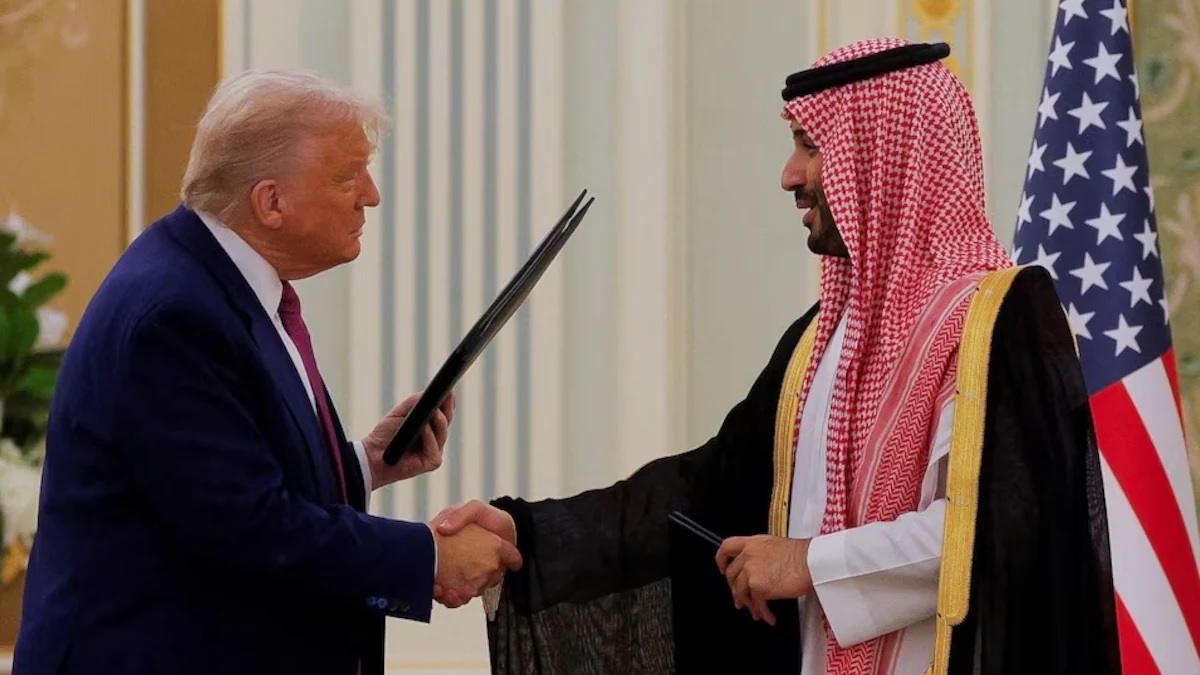The United Arab Emirates (UAE) and the United States on Thursday, May 15, 2025, signed a groundbreaking agreement to construct the world’s largest artificial intelligence (AI) campus outside of the U.S.
This marked a significant step in the UAE’s ambition to become a global leader in AI.
This deal, finalized during Donald Trump’s visit to the Middle East, is one of several AI-related agreements signed on the trip.
However, it has raised questions over national security and technological control, particularly given concerns about China’s potential access to U.S.-developed AI technologies.
The centerpiece of the agreement is a 10-square-mile (25.9 square kilometers) AI campus in Abu Dhabi.
It will feature 5 gigawatts of power capacity dedicated to AI data centers.
The campus will be constructed by the state-backed UAE firm G42.
However, to address American security concerns, these facilities will be operated by U.S. companies, ensuring American-managed cloud services throughout the region, according to U.S. Commerce Secretary Howard Lutnick.
This deal gives the UAE broader access to advanced U.S. AI chips.
While specific chip models were not disclosed, sources told Reuters that the agreement could allow the UAE to import up to 500,000 of Nvidia’s most advanced AI chips annually starting in 2025.
Nvidia CEO Jensen Huang was seen in discussions with Trump and UAE President Sheikh Mohamed bin Zayed Al Nahyan during the announcement at a palace in Abu Dhabi.
The UAE, heavily investing in AI development, views this deal as a major diplomatic and technological win.
The Gulf state has been said to be navigating a delicate geopolitical balance.
It is reportedly maintaining close relations with its strategic partner, the U.S., while continuing significant trade with China, its largest trading partner.
Under the Biden administration, these ties to China resulted in restrictions on the UAE’s access to advanced U.S. chips.
The current agreement signals a shift, reflecting the Trump administration’s belief that such technologies can be shared securely.
This is especially if the data infrastructure is operated by American entities.
The White House emphasized that the agreement contains significant national security guarantees.
The UAE has pledged to align more closely with U.S. security standards and regulations.
These include stringent safeguards to prevent unauthorized diversion of U.S.-origin technologies.
The initiative has received backing from key leaders in the AI and semiconductor industries.
CEOs like OpenAI’s Sam Altman and Nvidia’s Huang support the partnership.
It is expected that the partnership would expand their companies’ global reach and generate substantial commercial gains.
The agreement also outlines commitments from major U.S. tech firms:
Qualcomm will lead efforts to establish an AI engineering center, and Amazon Web Services will collaborate with regional partners on cloud infrastructure and cybersecurity development.
Despite this forward momentum, some U.S. officials and analysts remain uneasy.
The U.S. has long pursued protectionist policies to prevent China from acquiring advanced semiconductors, often by regulating third-party transfers through intermediary nations.
Critics argue that expanding access to such technologies in the Gulf could inadvertently weaken U.S. control over the global AI race.
One concern is that China could find indirect pathways to these technologies, possibly through AI chip smuggling.
This practice is reportedly traced through countries like Singapore, Malaysia, and the UAE.
David Sacks, Trump’s AI czar, addressed these issues during a speech in Riyadh.
He asserted that the Biden administration’s export controls were never meant to restrict technology access to “friends, allies, and strategic partners” like the UAE.
Analysts interpret this policy shift as an attempt to recalibrate rather than abandon America’s control of the global tech ecosystem.
Mohammed Soliman,explained that this strategic pivot enables the UAE to enhance its tech alignment with the U.S. without severing ties with China.
Soliman is a senior fellow at the Middle East Institute.
“It doesn’t mean abandoning China,” he noted, “but recalibrating tech strategy to align with U.S. standards in critical areas such as compute, cloud infrastructure, and chip supply chains.”
The groundwork for this deal was laid months earlier.
AI had been a key topic during Sheikh Mohamed bin Zayed Al Nahyan’s visit to Washington in December, near the end of Biden’s presidency.
G42 and MGX—two UAE state-affiliated entities leading the country’s AI investment push, have stakes in U.S. tech firms like OpenAI and xAI, Elon Musk’s AI venture.
Microsoft also committed $1.5 billion in investment to G42 in 2024.
In response to American concerns, G42 has reportedly begun distancing itself from Chinese hardware.
It has reportedly removed existing Chinese components from its infrastructure and divesting from China-linked investments.
Nevertheless, the presence of major Chinese firms such as Huawei and Alibaba Cloud in the UAE remains a concern for U.S. regulators.
The risks are compounded by evidence of illicit AI chip smuggling to China, reportedly originating from countries including the UAE.
This historic AI partnership represents both opportunity and risk: a leap forward in global AI cooperation, but one fraught with geopolitical sensitivities and the challenge of safeguarding technological dominance.







